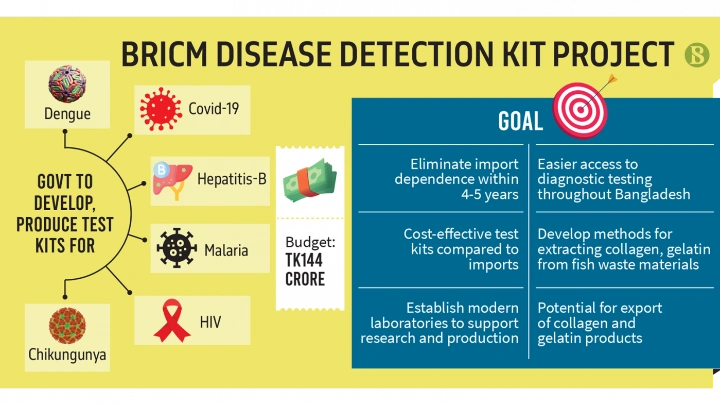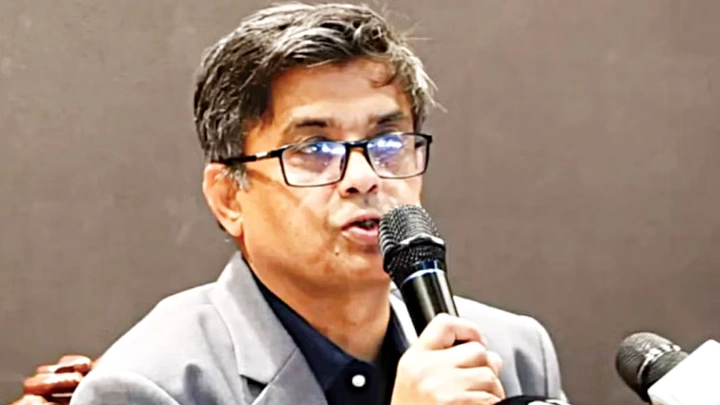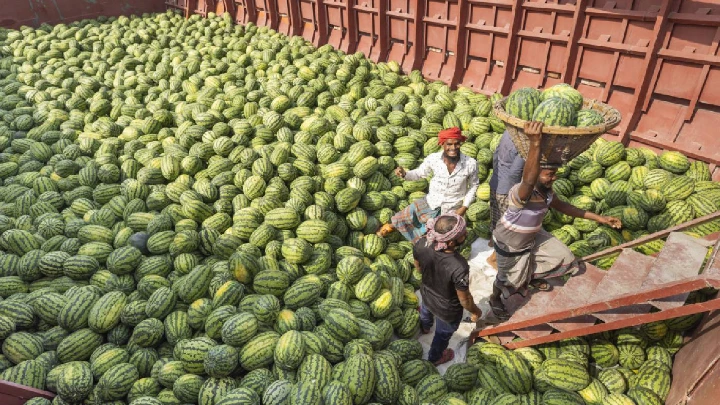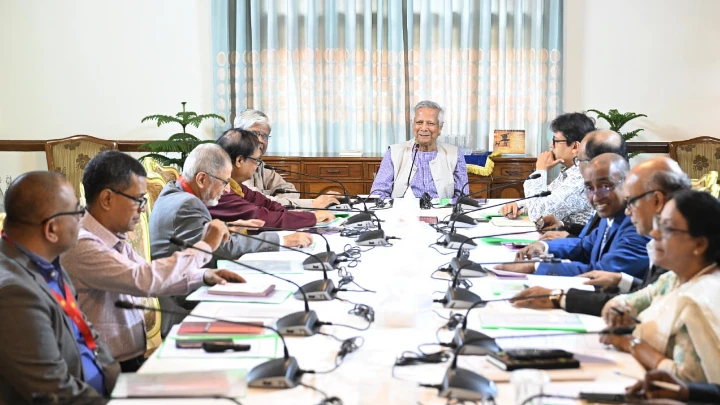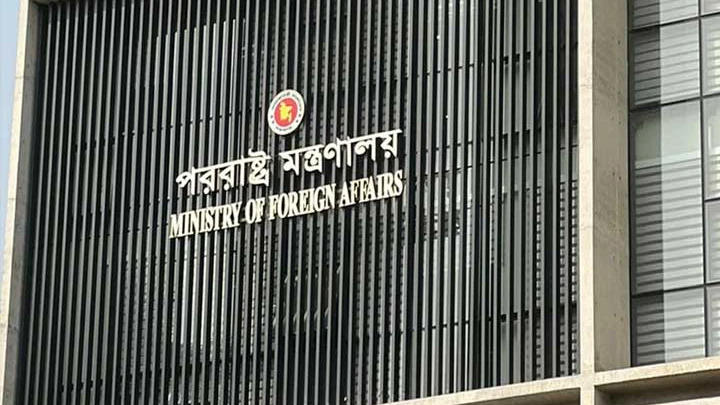The initiative is part of a Tk144 crore project aimed at producing diagnostic devices and establishing state-of-the-art laboratories
Govt to produce disease detection kits locally, reducing import dependency
TBS || Shining BD
The Bangladesh Reference Institute for Chemical Measurements (BRICM) has launched an ambitious initiative to domestically manufacture various disease detection kits, including those for dengue, chikungunya, hepatitis B, malaria, and Covid-19.
BRICM aims to reduce the country's reliance on imported diagnostic devices while strengthening the healthcare infrastructure.
The initiative is part of a Tk144 crore project aimed at producing diagnostic devices and establishing state-of-the-art laboratories.
The proposal, led by BRICM, envisions the creation of easily accessible, affordable, and high-quality test kits for detecting life-threatening diseases such as dengue, chikungunya, and hepatitis B.
According to the Bangladesh Investment Development Authority, the medical device market in the country is currently valued at $442 million, with an annual growth rate of 13%. By 2025, this figure is projected to soar to $820 million, with a staggering 93-95% dependency on imported devices.
Import dependency on testing kits was acutely felt during the Covid-19 pandemic, disrupting testing activities due to shortages of crucial supplies. This challenge extends to other fatal diseases like dengue, chikungunya, and hepatitis B.
Dr Arifa Akram, assistant professor at the Department of Virology, National Institute of Laboratory Medicine and Referral Center, highlighted the pressing need for locally produced kits, citing instances of shortages worsening by currency fluctuations.
The initiative to manufacture kits domestically promises cost-effectiveness and enhanced accessibility to critical medical resources, Dr Akram said.
Md Moniruzzaman, senior scientific officer at BRICM, said they are pursuing the development of dengue kits, awaiting approval for production, while also working on other essential diagnostic solutions. Through this project, BRICM aims to stimulate research endeavours and production capacities by establishing modern laboratories.
BRICM officials said that with coordinated efforts from BRICM and private enterprises, import dependency on test kits could be eradicated within the span of 4-5 years.
BRICM submitted its project proposal to the Planning Commission for approval. On 13 November 2023, the Evaluation Committee of the Planning Commission reviewed the proposal and granted initial approval.
The project was then forwarded to the Executive Committee of the National Economic Council (Eecnec). It is now awaiting final final approval.
Dengue test kit
The project proposal mentions that Bangladesh imports around 5 million dengue testing kits every year from such countries as the United States, China, Korea, Australia, India, and from Hong Kong.
Dengue outbreaks usually occur in Bangladesh from July to October, resulting in a daily demand for 20,000 tests and a monthly demand for 500,000 tests. Each imported kit costs around Tk380 and the test costs approximately Tk1,000.
However, BRICM's locally developed kit would cost only Tk100 each. According to the proposal, this will not only save costs but also reduce the need for foreign exchange.
Chikungunya test kit
Chikungunya becomes more prevalent in Bangladesh between April and September, prompting a daily demand of around 5,000 tests and a monthly demand of approximately 200,000 tests during this period.
Annually, Bangladesh imports about 2 million kits from countries such as the USA, China, Korea, Australia, India, and from Hong Kong. The average cost per test ranges from Tk500-1,200, with each kit priced at Tk320-350. In contrast, BRICM's kits are priced at a mere Tk100 each.
Endotoxin detection kit
The Endotoxin test has a daily average demand of 2,000 and a monthly average of 60,000. It is not manufactured locally and is imported from countries like China, India, Japan, and the USA. With an annual demand of 200,000, it costs Tk14,000 per test and Tk2,000 per kit. BRICM plans to develop the kit at a cost of Tk500 each, offering a more affordable option.
Hepatitis B surface antigen kit
The hepatitis B test sees an average daily demand of 3,000 and a monthly average of 100,000. Kits are imported from China, India, Japan, USA, and Taiwan, with 1 million kits imported annually. The imported test costs Tk1,050, while the kit is priced at Tk220. Conversely, BRICM plans to offer each kit at just Tk100, significantly reducing costs.
Malaria test kit
The project proposal highlights the prevalence of malaria in approximately 13 districts of Bangladesh, including the hill tracts. Malaria outbreaks typically occur between May and October, with a demand for around 300,000 tests during this period.
The test kits are imported from countries such as the USA, China, India, Korea, and from Hong Kong. Each test costs around Tk250 while the kit is sold at Tk100. BRICM estimates the production cost of each kit to be approximately Tk80, aiming for cost-effective solutions.
Pregnancy tracking kit
The pregnancy tracking kit has a monthly demand of about 160,000, totalling approximately 2 million per year. These kits are sourced from China, India, Hong Kong, Japan and the USA. While the average cost of each test in hospitals is around Tk400, the average market price of each kit ranges from Tk70-100. However, the production cost of each kit developed by BRICM is approximately Tk80.
Multiplex RT-PCR kit for SARS-CoV-2 virus detection
Currently, there are no domestically produced test kits for detecting the SARS-CoV-2 virus in the country. This reliance on imports not only results in high costs but also drains foreign currency. Establishing domestic production of these kits is expected to reduce the overall expense of testing and treatment.
HIV test kit
The average monthly demand for HIV tests is around 100,000, totalling about 1.2 million per year. These kits are imported from various countries including China, India, Japan, Taiwan, South Korea and the USA. While the test itself costs Tk400, the kit is priced at Tk100. Each kit developed by BRICM will also cost Tk100.
Collagen-based products
Collagen, essential for human skin, serves as a crucial raw material in cosmetics and pharmaceuticals. Despite being rich in fish scales, currently, Bangladesh exports them at a low price and imports collagen at a higher cost. BRICM has devised a simple method to extract collagen from fish scales, potentially allowing Bangladesh to earn foreign exchange by domestically producing collagen.
Gelatin
Gelatin, widely used in capsules, cosmetics, and food, can be extracted from fish waste, such as fish ice, which is considered waste in Bangladesh. BRICM has developed an easy method to extract gelatin from fish ice after extracting collagen. This initiative could help meet the current demand for gelatin, reducing import dependency and even opening avenues for export.
Shining BD

